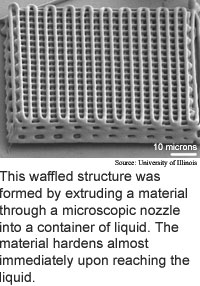
Printer writes micro 3D objects
Existing three-dimensional printers, which
build up objects from layers of melted metal powder, melted plastic powder
or quick-drying ink-jet ink, print relatively slowly because it takes
time for each layer to dry. And like that of their two-dimensional counterparts,
the print resolution, or feature size, is limited by the granular nature
of these processes.
University of Illinois researchers have come up with a new type
of quick-setting three-dimensional ink that works a bit like a microscopic
tube of toothpaste. The researchers' printer robotically deposits a continuous,
elastic-like ink filament into a liquid rather than putting ink drops
onto a surface.
The filament hardens in the liquid rapidly enough to allow for
printing three-dimensional structures that have features like unsupported
spanning elements. The process yields complete three-dimensional structures
in about five minutes, and provides resolutions that are close to two
orders of magnitude finer than existing methods, according to the researchers.
The researchers' prototype has nozzles that vary in diameter from five
microns to 0.5 microns. A micron is one thousandth of a millimeter.
Because the resolution is so high, the process has the potential
to produce templates for structured materials, like photonic band gap
materials used to control light, microfluidic devices used for biological
and chemical testing, and bioscaffolds for tissue engineering.
The researchers are currently refining inks for structures made
from refractive-index materials like selenium and bioactive materials.
The method could be used in photonic bandgap and tissue engineering
applications in two to five years, according to the researchers. The work
appeared in the March 25, 2004 issue of Nature.
Material grabs more sun
Spoke polarization tightens focus
Molecule makes electric motor
Optical quantum memory designed
Briefs:
Printer writes micro 3D objects
Tiny rotors spin into place
Nanotube forms drive shaft
Photons teleported six kilometers
Magnets align nanotubes in resin
Sturdy quantum crypto proposed

Research Watch blog
View from the High Ground Q&A
How It Works
RSS Feeds:
News
Ad links:
Buy an ad link
Ad links: Clear History
Buy an ad link
|
TRN
Newswire and Headline Feeds for Web sites
|
© Copyright Technology Research News, LLC 2000-2010. All rights reserved.